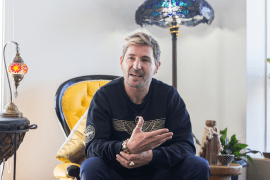By Dr Laura Markham
“Today I will let myself feel what I am feeling and let my children feel what they are feeling…I’ll pay attention to what each of us is feeling and give those feelings some respect and space. There’s nothing so bad about them; they are only feelings and need not threaten me.” – Tian Dayton
Are your feelings dangerous? Never. But most of us are afraid of our strong feelings. And we’re afraid of our children’s emotions. Why?
Because the power of our emotions can be overwhelming. We all know what it feels like to want to hit someone. And so often when we act on our feelings, we do things we’re sorry for later, whether that’s smacking our child, screaming something hurtful at our partner, or throwing a “tantrum” at the office.
But it isn’t the feelings that are dangerous. What’s dangerous is taking action based on them. We think we’re “fixing” things, but the action we take is designed only to alleviate our upsetting feelings. So despite our urgent need to take action, the action we take when we’re upset makes everything worse.
In the moment, though, when we can’t tolerate our feelings, we lash out. Then, too often we justify our actions, blaming the other person for “making” us feel that way.
So, should we repress our emotions? No. Repressing feelings makes us MORE likely to act on them. Emotions are a reaction to how we’re perceiving our experience, whether we feel disrespected by our child, betrayed by our partner, or taken for granted by our boss. The other person doesn’t “cause” the feelings of course; they’re ours, and they’re triggered by our own interpretations. But the emotions are a real event in our bodies, complete with fight or flight hormones. When we stuff our feelings down rather than acknowledging them, we carry them around like a boiling pot. We make ourselves sick and tired. Our feelings often burst out unbidden and we find ourselves out of control. (You may know this as the Mummy or Daddy Tantrum.)
Luckily, there is a solution, and it’s the key to healthy emotional self management:
Allow yourself to feel all your emotions, but resist acting on them while you’re upset.
This lets us CHOOSE whether to act on those turbulent feelings. It allows us to regulate our behavior, because we’re regulating our emotions. By contrast, stuffing our emotions pushes them out of conscious control, where they burst out in ways we’re sorry for later.
Of course, this is easier said than done. If we didn’t have parents who helped us with emotion when we were young, it can seem impossible. Luckily, it gets easier with practice, because you’re actually rewiring your brain. Here’s how.
- Allow all feelings, yours and your child’s.
Notice them. Accept them. Acknowledge them as just part of being human.
- Limit behavior.
Just because your kid is allowed to be jealous of the baby doesn’t mean he can hit her. Just because you’re allowed to be fed up with your two-year-old doesn’t mean you scream at her.
- Notice that feelings come and go.
The fact that you’re feeling something doesn’t mean you’ll be feeling it tomorrow. Don’t get attached. You aren’t “mad” or “sad” — you’re feeling “mad” or “sad.” You are so much greater than your emotions, no matter how powerful they feel at the moment. You really can just notice them and let them go.
- Don’t take feelings personally.
Just because your child is expressing anger at you doesn’t mean her anger has anything to do with you. Just because you’re mad at your partner doesn’t mean your partner is wrong. Nobody has to be wrong.
See next page for six more useful tips…











